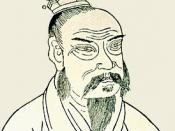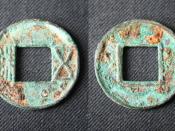The demise of the Qin Dynasty sparked the fear that another centralized authority could be harmful for modern day China. However, with such vast territory, China could not be ruled by local lords, simply because it would be counter producing for the conjunct advances, such as trading networks, technological advances, and agricultural advancements (Encarta). Centralized rule returned quickly to China under the hands of a commander named Liu Bang. He was not vivid or much of a lover, but he was determined and preferred to set realistic goals to accomplish them. When he was established as the head of the Han Dynasty, he sought to centralize rule in China. Despite he did not favor much a centralized rule; he opted for a centralized rule simply because by the 200ÃÂs BCE, China was in no means of becoming a democracy. Internal factors did indeed bring about the demise of the Han Dynasty, but by no means was it a single event, but rather a series of event that ultimately led to the complete fall down of such a lavished dynasty.
Still convinced, Liu Bang sought to decentralized power by giving power to his family. However, this came out wrong due to the fact that when the Xiongnu warriors besieged his region and no support was given by his family. As a result he sought a policy of centralization of power. He took the lands from his family, and turned most to the power of the state. As a result, an administrative bureaucracy was formed and the land was managed from here. When he did this, he said, "At last the whole world is mine," referring to all the power that was falling to his hands as a result of the centralization of power (Edwards).
Liu Bang believed that centralized power was the best way to rule. As a result, Liu Bang began to build a new capital at ChangÃÂan. In this new capital, Liu Bang sought control and centralized the management of his empire. Here, he assigned the generals, chancellors, and other governmental figures. By doing this, he eliminated almost by complete the royal family and thus had less bureaucratic opponents. To obtain support from the peasants, he lowered taxes and provided protection from nobles whom were trying to retrieve lands that they had lost. Also, the peasants had strong faith in Liu Bang simply because he was a peasant before and they believed that he would govern in their interest (Encarta).
No doubt about that Liu Bang was an excellent ruler, but possibly better was Han Wudi often named the ÃÂMartial EmperorÃÂ (Edwards). He built a bureaucracy to administer his empire and he relied on legalist principles. He tried to establish vast amounts of roads, and canals to impulse HanÃÂs productivity. Indeed productivity increased, but at a high cost; many of the high ranked Chinese, as a result of high demand, came for the most part uneducated as a result. Therefore he established the Imperial University that prepared young men for service at the government.
Once Han Wudi centralized the power in the Empire, the emperor centered his attention to expand the empireÃÂs borders. First, he invaded North Vietnam and Korea and brought about Confucianism and legalism. However, this sparked Xiongnu fear and thus they believed that they could be attacked by the Han Dynasty. Tensions aroused and the Han decided to attack the Xiongnu because they believed they were a direct threat to their empire. As a result, they attacked the vast threat and were successful. Although the Han were victorious, they were about to face even greater trouble; keeping control of such a vast empire.
Despite that right after the conquest of the Xiongnu, the Han enjoyed a somewhat prosper era, they were at the dawn of major economic and social difficulties. With the newly conquered land, Han Wudi sought to create agricultural colonies in Xiongnu. However this turned erroneous and instead of helping the economy it demised it due to the fact that the land was not as fertile as the Han original land and it was also far, so the empire needed to transport the goods all through the empire. Maintaining the agricultural colonies was extremely expensive. As a counter measure, Han Wudi raised the taxes and took the land of many wealthy landowners to redistribute it.
As tensions increased through the empire, the distinction between the rich and the poor increased. While the rich wore silk cloth and leather shoes and had pork, and other fine foods, the poor were left with barely cloth and had only rice for food. Even worse, then poor were aware of this and at many instances organized rebellions against the rich and the Han due to the fact that they knew resources were there but were not just distributed properly.
Land distribution was one of the main burdens for the Han Dynasty. To make matters worse, during the climax of the problems with land distribution, economic problems brought about by poor harvest, and high taxes made things more complicated. In order to pay debt many poor and small landowners had so sell their land to rich landowners in a loss. This meant that if they paid five-hundred coins to buy their land, they would sell it at three-hundred coins. The rich landowners oppressed their seller since they knew they needed some money to pay the debt they owed. With the favorable conditions, the rich landowners realized something favorable for them, since all of the small landowners, and poor people lost their jobs and had to sell their land, or subdue themselves and their family to slavery they could become useful resources. As a result, the rich landowners took advantage of the situation. They started to employee those whom recently had to sell their land. Consequently, they were able to pay them little simply because they had no other choice. As a result, they were able to increase their efficiency.
Conscription to the military was also another alternative for the already discontent peasants. A Confucian Scholar, Dong Zhongshu proposed to Wudi a remedy for the economic and social crisis. He sought out to decrease taxes on poor, to reduce the unpaid labor, and to improve the distribution of the land. Although Wudi did favor this, he was fearful of the rich landowners due to the fact that they provided much of the food for China (Edwards). Instead he sent out spies to check if the rich landowners were paying taxes.
From that point on, China remained similar for the next hundred years, with the exception of the Ying-Yang philosophy, Taoism and the sacred books of peace. By the 2nd century CE, China was more advanced than Europe in many areas such as time keeping, calendars, seismographs, cartography, and astronomy. Despite such advancements, still something remained the same. Life continued to be hard on China majority, the peasants. Still by this time they had to labor for the emperor, still had to pay high taxes, and still were being treated as inferior being from that of the government (China Han Dynasty).
Chinese peasantÃÂs revolutionary hearts were sparked once again during the reign of Shundi. Peasants by this time believed that the Han emperors had lost the mandate of heaven. Concurrent mismanagement and overall discontent spread this idea. As a result, peasantÃÂs rebellions resurfaced. During the rule of Huandi problems still were present. In 159 CE Huandi died and the eunuchs, or castrated people, whom at this time were very powerful, tried to eliminate the royal family so they could gain control of the throne (Theobald).
When the great-great-grandchild of the emperor Zhangdi was chosen as the new emperor (emperor Lingdi) a clash erupted between the eunuchs and the Confucianism gentry (Theobald). In the provinces outside of the city, respect for the authority of the emperor started to decline. No longer did the peasants treat with respect the emperor, but instead depreciated him since peasants believed that emperors had long lost the mandate of heaven.
With the ongoing internal crisis in the Han Dynasty raids by the Xiongnu added. They realized that the Han were weak once again and decided to resume raids against them. Attempting to defend themselves, the Han decided to use the Yellow Turbans to fight against the Xiongnu (China Han Dynasty). Despite that they were successful before, the Yellow Turban fighters were somewhat stupid due to the fact that they believed that they were elected by god and by good and thus they were immortal. Therefore they decided to fight without weapons. This ideal led to their destruction because the Xiongnu killed them with no trouble.
Emperor Ling died in 188 in the midst of sporadic rebellions (Han Dynasty). As a result, a military general tried to gain control at the palace. He planned to take control from the eunuchs and their supporters. He invited general Dong Zhou from the North to help him take over the capital of the Han Dynasty (Encarta). However, fighting broke before he arrived and the general was killed by a eunuch. As a result the generalÃÂs allies burned the palace killing every eunuch they could find.
Once Dong Zhou arrived to the capital he was found in turmoil. He realized that his friend was killed and that the palace was burned. He realized that in order to obtain power he would have to take extreme measures. As a result he killed both the emperor, Shaodi and the empress dowager. He appointed a nine year old boy called Xiandi (Hooker). To make matters worse, he kept the killing and instead of improving the court he worsened it because he used his sword before using any other mean. So did his army, and as a result his reign was known as a bloody one because his army killed as it pleased.
When Dong Zhou had enough killing in the city he started to battle against other generals. Xiandi had a special interest for ChangÃÂan. He believed that from here he would be able to govern the Han Empire better. Therefore, he burned Luoyang and started a march towards ChangÃÂan with all of the people of Luoyang. However he forgot of his people and many civilians died of exhaustion and starvation along the way. Justice soon paid back and Dong Zhou was killed by his subordinate officers and his corps was thrown into the mob that much hated him.
When Xiandi arrived to ChangÃÂan, Cao Cao, an avid general took over him, and declared himself as the boyÃÂs ÃÂimperial ministerÃÂ (Han Dynasty). Cao Cao believed that he could unite China again and he created an army of more than a million men. He then confronted the armies of Liu Bei and Sun Quan. However he was unsuccessful and he was driven back north again.
On the other hand, Liu Bei was a member of the Han royal family and he was believed to restore peace to the Han Dynasty. However, he was treason by his fellow mate Sun Quan realizing that if Liu Bei restored peace then he (Sun Quan) would be subordinate to him. As a result he united with Cao Cao (Kingdom of Wei) and established the Kingdom of Wu (China Han Dynasty). As a result the period of the Three Kingdoms had begun, and by this time the Han Empire was dissolved and only history remained from it.
The fall of the Han Dynasty cannot be accused of a single event, but rather of several. Land distribution, loss of the mandate of heaven, and outside pressure sparked overall internal disunity. As a result, the peasants, the majority during the Han Dynasty were paid little attention. Despite that the peasants resisted to and had faith in their emperor; in the end they lost faith simply because they realized that the emperorÃÂs interests were not the same as theirs. Therefore they rightfully revolted against their ruler and were able to meet their demand.
"China to the Fall of the Han Dynasty." MacroHistory: prehistory to the 21st century. 2 Mar. 1998. 6 Jan. 2008 .
Edwards, Mike. "Han Dynasty @ National Geographic Magazine." National Geographic Magazine @ NationalGeographic.com. 6 Aug. 2004. 6 Jan. 2008 .
"Han Dynasty - ninemsn Encarta." ninemsn Encarta : Online Encyclopedia, Dictionary, Atlas, and Study. 8 July 2007. 6 Jan. 2008 .
"Han Dynasty." China Window - The Best Way to China. 2 May 2001. 6 Jan. 2008 .
Hooker, Richard. "Ancient China: The Former Han, 206 BC-25 AD ." Information Technology Learning Systems Group - Home Page . 6 June 1999. 6 Jan. 2008 .
Theobald, Ulrich. "Chinese History - Han Dynasty æüâ (www.chinaknowledge.de)." www.chinaknowledge.de. 2 June 2000. 6 Jan. 2008 .


